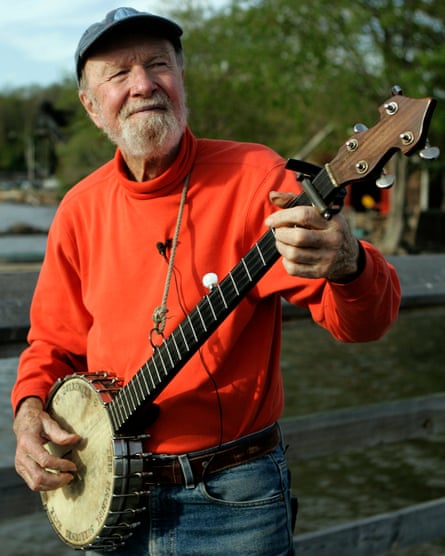The first verse of the civil rights anthem We Shall Overcome is no longer under copyright, a New York federal judge ruled on Friday.
The Guardian’s product and service reviews are independent and are in no way influenced by any advertiser or commercial initiative. We will earn a commission from the retailer if you buy something through an affiliate link. Learn more.
Described as the “most powerful song of the 20th century” by the Library of Congress, the suit against the existing copyright holders was brought last year by the same legal team who had successfully disputed longstanding ownership claims over Happy Birthday to You.
Lawyers leading the class action against the Richmond Organization and Ludlow Music, claimed We Shall Overcome was an adaptation of an African American spiritual and therefore in the public domain and had only later been adopted by folk singer Pete Seeger, copyrighted, and established as an anthem of the 1940s labor protest movement.
They pointed to Seeger’s 1963 memoir in which he wrote that he’d been advised by his music publishers: “If you don’t copyright this now, some Hollywood types will have a version out next year like ‘Come on baby, we shall overcome tonight.’”

The song’s first known printed reference in the February 1909 edition of the United Mine Workers Journal. Elements of the song, which Martin Luther King referenced in his final sermon, have also been traced to a Beethoven hymn.
In her decision, US district judge Denise Cote wrote that the existing copyright holders had not clearly identified the original work on which their derivative was based nor demonstrated that changes Seeger allegedly made to the first – and identical fifth – verse rose to sufficient originality to merit copyright protection.
Earlier versions of the song give the lyrics as:
We will overcome,
We will overcome
We will overcome some day
Oh down in my heart, I do believe
We’ll overcome some day
Lawyers seeking to protect the copyright claimed that Seeger had changed the first verse – altering “will” to “shall” and “down” to “deep”.
We shall overcome,
We shall overcome,
We shall overcome some day;
Oh, deep in my heart, I do believe,
We shall overcome some day.
“The phrase ‘we will overcome’ is about strength and determination, force, action; ‘we shall overcome’ is about faith in the future despite formidable obstacles,” claimed Paul LiCalsi, a lawyer for the copyright holders.
The opposing lawyers described a change like “will” to “shall” as “patently trivial and insignificant: the words are at most different grammatical variations of the future tense. Folk music does not observe such grammatical formalities; rather folk music is filled with lyrical expressions that do not conform to grammatical rules or norms.”

Judge Cote’s decision was limited only to the first verse. The justice did not rule on other aspects of the case, including who really authored the song or if the copyright had been fraudulently obtained.
The initial effort to free We Shall Overcome had been joined by the production company behind The Butler, which had planned to use the song in the Lee Daniels-directed film but could not meet the $100,000 price tag.
The film-makers claimed they had originally wanted to use the song in several scenes, including scenes depicting the 1963 riots in Birmingham, Alabama, the 1965 riots in Selma, but had been “repeatedly stonewalled and rebuffed”. The copyright holders countered that the song’s royalties had been donated to the preservation of civil rights movement documents and African American focused arts and cultural projects.
